| Srl | Item |
| 1 |
ID:
174577


|
|
|
|
|
| Summary/Abstract |
This article discusses the political-diplomatic estrangement between Israel and Brazil during Lula da Silva period (2003–10). Despite a productive bilateral commercial relationship, the same couldn’t be said of the political dimension, where relations were particularly strained due to Brazil’s stance regarding the Israeli-Palestinian conflict and its role as an interlocutor in the Iranian nuclear programme.
|
|
|
|
|
|
|
|
|
|
|
|
|
|
|
|
| 2 |
ID:
174576


|
|
|
|
|
| Summary/Abstract |
This article compares the amount of land designated for various uses in the Jewish and Arab municipalities in Israel between the years 2003–13. It is generally accepted that the Arab-Jewish conflict in Israel is heavily based on land ownership. This conflict still has implications for the policies and actions of the State of Israel on the one hand, and the attitudes and behaviours of the Arab population on the other. Two main conclusions emerge from this article. The first is that in 2013, the area per capita used for residential living in Arab localities was larger, presumably because of the lack of high-rise buildings. The second conclusion is that the areas designated for economic and public purposes in the Arab sector are much smaller. The Israeli government should therefore allocate additional government land to the Arab local authorities.
|
|
|
|
|
|
|
|
|
|
|
|
|
|
|
|
| 3 |
ID:
174578
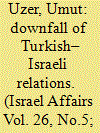

|
|
|
|
|
| Summary/Abstract |
The entire edifice of the strategic Turkish-Israeli alliance of the 1990s collapsed during the last ten years, with relations between the former partners characterised by antagonism and total lack of trust that make a genuine reconciliation rather inconceivable despite the existence of weighty common military and economic interests. This article examines the origins of the bilateral relations, the main causes of its decline, and the prospects for a future thaw.
|
|
|
|
|
|
|
|
|
|
|
|
|
|
|
|
| 4 |
ID:
174575


|
|
|
|
|
| Summary/Abstract |
This article examines the evolution of stock market analysts’ recommendations in Israel in 2002–17. Over these years, Israel has been marked by far-reaching changes in its economy. Its capital market has grown, developed, and embarked on a process of regulation. To track the quality of analysts’ recommendations, nine indices from stock exchanges that were found leaders in their recommendation were selected to represent the spectrum of investment opportunities. Calculating the deviation of two investment portfolios, analysts’ recommendations and equal division, from the efficient portfolio frontier leads to the conclusion that until 2007 the portfolio of analyst’s recommendation has no added value compared to equal division and only afterwards a significant gap has been opened.
|
|
|
|
|
|
|
|
|
|
|
|
|
|
|
|
| 5 |
ID:
174574


|
|
|
|
|
| Summary/Abstract |
This article reviews the female labour force participation rates (LFPR) of Jewish and Arab women in Israel from 1955 to 2017. One finding of the review is that the female Jewish LFPR are very high, while the female Arab LFPR are very low. We argue that the most likely explanation for this difference is cultural forces in the respective communities which either encourage or discourage women from working. We find support for this idea from LFPR data within subsectors of the two groups, Bedouin women living in the south of Israel, and Jewish women born in the land of Israel.
|
|
|
|
|
|
|
|
|
|
|
|
|
|
|
|
| 6 |
ID:
174579
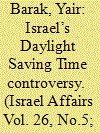

|
|
|
|
|
| Summary/Abstract |
From its establishment until 2013, the issue of Daylight Saving Time (DST) featured on Israel’s political agenda with the religious sector opposing by and large its implementation as an infringement on religious rituals and a disruption of the Hebrew-Jewish calendar and secularists presenting their struggle for DST as a fight of progress (light) against reactionary forces (dark).
|
|
|
|
|
|
|
|
|
|
|
|
|
|
|
|
| 7 |
ID:
174573
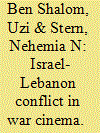

|
|
|
|
|
| Summary/Abstract |
This article focuses on the organisational aspects of combat as represented in Israeli films about the Lebanon Wars. It analyzes four prominent films that relate to Israel’s engagement in Lebanon from the 1982 war to its operations in the southern security strip. The analysis is augmented by comparison to prominent Israeli war films on the 1973 Yom-Kippur War. These films reflect a common and coherent Military Habitus that originates in the organisational principals that define ‘Israeli National Way of War.’ This analysis offers an alternative viewpoint to interpretations that view war cinema as manifestations of broader national narratives.
|
|
|
|
|
|
|
|
|
|
|
|
|
|
|
|
| 8 |
ID:
174580
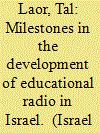

|
|
|
|
|
| Summary/Abstract |
For over 25 years, college radio stations have been operating in academic institutions in Israel. This article explores the main milestones in the development of college radio in Israel; the processes of establishment and ideological vision and goals underlying them; and the impact of college radio on political, social and cultural history of Israel.
|
|
|
|
|
|
|
|
|
|
|
|
|
|
|
|
| 9 |
ID:
172147
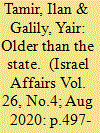

|
|
|
|
|
| Summary/Abstract |
In May 1929, the Israel Football association was officially recognised by international sport organisations, after extensive political efforts. International recognition effectively institutionalised Israel’s popular sport, 1 which would eventually become not only the focus of massive interest but also a major actor in the social, economic, and political spheres of Israeli society.
|
|
|
|
|
|
|
|
|
|
|
|
|
|
|
|
| 10 |
ID:
174581


|
|
|
|
|
| Summary/Abstract |
Schools, as public institutions cope with the challenge of immigrant absorption. Lipsky’s theory of street-level bureaucrats argues that civil servants at the end of the hierarchy are the most significant in implementing policy. This article examined the conditions that lead teachers to become street-level bureaucrats and cultural mediators, and how they influence student immigration policy. The qualitative study included interviews with 25 teachers of immigrants and found four conditions under which teachers positively influence policy on the ground. As they play significant roles in immigrants’ lives, investment in appropriate training for teachers of immigrants is recommended.
|
|
|
|
|
|
|
|
|
|
|
|
|
|
|
|